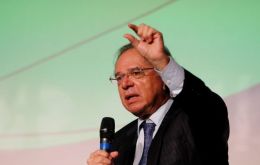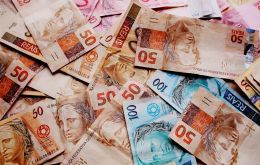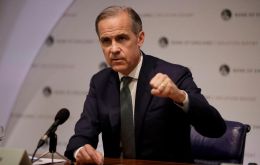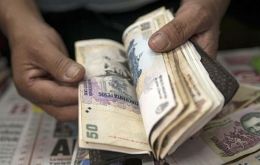MercoPress. South Atlantic News Agency
Tag: economy
-
Monday, May 20th 2019 - 09:15 UTC
German government advisor fears another European financial crisis: points to Italy

A senior adviser to the German government fears another European financial crisis could be brewing. Dr. Lars Feld, one of the German Council of Economic Experts, was one of the first last year to warn of a slowdown in Europe's largest economy.
-
Saturday, May 18th 2019 - 09:57 UTC
Brazilian economy flirting with economy: “we are at the bottom of the well” says minister Guedes

Feeble growth forecasts and waning confidence in President Jair Bolsonaro sent Brazil's stocks and currency to their lowest level of the year this week, as analysts warned of further falls.
-
Friday, May 17th 2019 - 09:24 UTC
Fitch rating agency says uncertainty overflying the Brazilian economy

Brazil’s push to overhaul its costly social security system is a welcome step toward healing public finances and the economy, but is not enough to stabilize public debt or trigger a positive review on the country’s credit rating, directors at rating agency Fitch said on Thursday.
-
Saturday, May 11th 2019 - 09:03 UTC
Inflation in Brazil peaks to an annualized 4.9% during April

Annual consumer price inflation in Brazil rose to 4.9% in April, government statistics agency IBGE said on Friday, the highest in over two years and further above the central bank's end-year target of 4.25%.
-
Tuesday, May 7th 2019 - 09:40 UTC
Argentina's recession steams on: industrial output in March dropped 13.4%

Argentina's industrial output slid a steeper-than-expected 13.4% in March compared with the same month last year, the government's Indec statistics agency said on Monday, as the recession-hit economy struggles to return to growth.
-
Tuesday, May 7th 2019 - 09:15 UTC
US Federal Reserve warns about stock prices and high corporate debt loads

The US central bank warned on Monday of persistent risks to the financial system posed by elevated stock prices and historically high corporate debt loads as well as the impact of President Donald Trump's trade wars.
-
Saturday, May 4th 2019 - 09:56 UTC
Brazil and Argentine currencies recover against a weaker US dollar

Latin American currencies ended on a high note on Friday against a weaker dollar after robust U.S. jobs data painted a brighter picture for global growth and gave the U.S. central bank more reason to stay on its dovish path.
-
Saturday, May 4th 2019 - 09:54 UTC
Brazilian industrial production down 1.3% in March and 6.1% from a year ago

Brazil’s industrial production fell 1.3% in March from the month before, statistics agency IBGE said on Friday, a steeper fall than economists had expected and another indication of the economy’s sub-par performance in the first quarter.
-
Friday, May 3rd 2019 - 09:03 UTC
Bank of England interest rate evolution depend on resolution of the Brexit impasse

United Kingdom interest rate increases could be “more frequent” than expected if the economy performs as the Bank of England is expecting, governor Mark Carney says. The markets are forecasting just one interest rate increase by 2021.
-
Tuesday, April 30th 2019 - 09:59 UTC
Argentine Peso gains strength as IMF agrees to more central bank flexibility

Argentina’s embattled peso gained strength on Monday after the central bank said it would ease limits on its foreign exchange market interventions, signaling its willingness to sell reserves in an effort to better control the volatility of the local currency. The peso began the session up 3.37% and closed 3.56% stronger at 44.37 per U.S. dollar.
